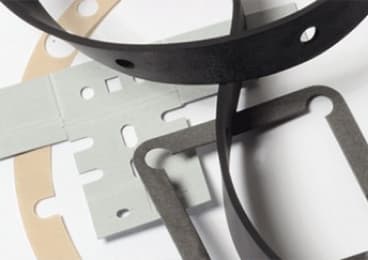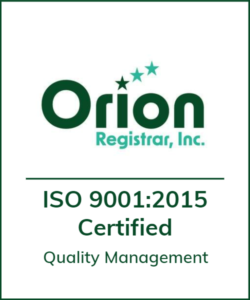Rubber is also commonly used with cloth or fabric-inserts. Common fabrics include cotton, nylon, polyester and fiberglass. These products will have 1 or more layers of fabric throughout the thickness of the rubber. Generally, the fabric is added to increase stability where mechanical fastening is necessary.

Gaskets
Because gaskets are generally low cost and appear to be simple, the criticality of their role in a device is often overlooked. They usually don’t garner much attention until there is a problem with an application or if there are high maintenance costs to service the gasket or related part. A solid understanding of the application parameters will enable the gasket designer to optimize the gasket to ensure a robust seal or optimal long-term performance. Every gasket application and material is unique but there are common elements that must be addressed to optimize the understanding of what the gasket is up against in the application.
What is a Gasket?
A gasket is a mechanical seal that fills the space between two or more mating surfaces, generally to prevent leakage from or into the joined objects while under compression. Gaskets compensate for "less-than-perfect" mating surfaces.
Gasket Specs
Temperature
Temperature can alter the characteristics of the gasket such as the sealing properties, compression set, and maximum allowable stress even if all of the mechanical elements of the joint are properly installed. It is important to take into consideration both internal and external temperatures. Determining the temperature range of the application is essential in the proper selection of a gasket.
Media
The media is the fluid or gas to which the gasket will be exposed. For example, gas may be more difficult to seal than most fluids. Chemical resistance of the gasket material is important because, without it, the other properties of the gasket are irrelevant. It is also important to keep in mind the effect temperature has on chemical resistance. Temperature causes many fluids to become more aggressive. Therefore, a fluid that can be sealed at ambient temperature, may adversely affect the gasket at a higher temperature.
Pressure/Compression
All gaskets require pressure and compression to form a reliable seal. It is important to understand the pressure the gasket will face from a well-connected flange, as well as the internal and external pressure it will be exposed to. Further, it is important to know whether there will be equal pressure applied to the gasket, or whether there could be rotational pressure as this can impact material selection.
There are other factors that can impact material selection related to a gasket.
UV/Environment – Prolonged exposure to sun or UV can negatively impact many materials, while others are made to withstand this.
Electrical requirements – whether it be electrical insulation or EMI (electromagnetic interference), there are materials that are specifically designed to meet a variety of electrical requirements.
Food or potable water – if gaskets are being used around food or water, they typically require FDA or NSF certification for this use.
Certifications – certain industries require material to meet established specifications. Examples include MIL-spec (military), AMS (aerospace), UL (flame resistance
Get Started with Your Custom Part
Contact UsExplore the Variety of Materials
View All Materials

Cork and rubber gaskets are commonly used in sealing flanges where there is contact with oil, fuel or natural gas and where bolting pressure is somewhat low. Both cork and cork/rubber gaskets are excellent when mating surfaces have possible imperfections or don't perfectly mate as they will conform to the surfaces.

Gaskets are commonly used in and around electrical applications. These electrical insulation materials are used to prevent or restrict the flow of electrical current; prevent electrical arcing; prevent electrical conductors from contacting unwanted objects; and other general electrical insulation applications.

EMI stands for electromagnetic interference. Electromagnetic energy can come from many sources and without proper protection, can result in the failure of certain electrical systems. EMI shielding gaskets can protect electronic systems against electromagnetic interference.

The FDA regulates materials that are in contact with food or beverages during processing, packaging or storage. We offer a number of different materials that are certified to meet FDA standards.

Felt remains a popular material used in certain gasketing applications. Felt is supplied in both wool and synthetic options. Wool felt is made from pressing premium wool fibers together. This type of product is commonly referred to as “pressed” felt.

Fiber-based gaskets are one of the most broadly used categories of products. Fiber products can offer a very wide range of benefits and fit a wide range of applications.

There are primarily two different types of foam, with a number of subsets under these two categories.
Polyurethane foam is a softer, open-cell foam that allows air and liquid to penetrate through the foam. Polyethylene foam is a more firm closed-cell foam that is more dense and rigid.

We process certain thin gage metals as well as some synthetic products that have a thin layer of metal within the material. These products can be offered in a variety of thickness, hardness and supporting material if one is used.

There is a broad range of engineered materials used for gasketing that are referred to as compressed sheet or non-asbestos. Generally, these materials are made with certain fibers (ie Aramid fiber) and other fillers with a rubber binder.

- Teflon Coated Fiberglass
- Grafoil / Flexible Graphite
- Mica
- Nomex / Kapton Laminates

An alternative to other synthetic or metal gaskets, plastic gaskets are durable and resistant to corrosion. Plastic gasket benefits include lightweight, low friction with excellent sealing and insulating properties.

Pressure Sensitive Adhesive (PSA) is commonly used throughout gasket applications. PSA can be used from a temporary means of holding a product in place during assembly to a more long-term permanent manner in which to bond 1 item to another.

Rubber is probably the most widely used gasket material. Rubber is offered in many different styles and grades to meet many applications’ needs. In addition, rubber is commonly available “off the shelf” in most styles, grades and thicknesses.

Closed cell sponge rubber gaskets use chemicals and heat to expand the material and create a “soft” or sponge rubber. Sponge rubber is generally sold by density or firmness. The primary types of solid rubber are also used to create sponge rubber. Sponge rubber is much more compressible than solid rubber and carries many of the benefits of solid rubber.

The guide will assist you in gasket material selection, gasket design and gasket application. Selecting the right gasket design and material is critical to the effective operation of a reliable joint. It involves taking into account a wide variety of application parameters such as function, temperature, fluid or gas, pressure, UV & Ozone, EMI/RFI requirements and other considerations such as FDA, NSF or WRAS requirements.



